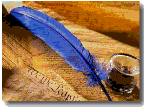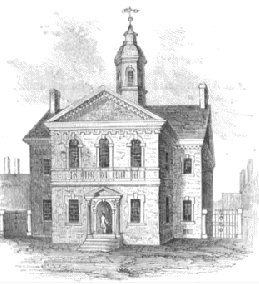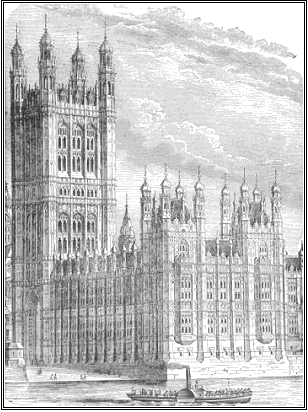
The Declaration of Independence
Thomas Jefferson's Account
Mr. Randolph was according to expectation obliged to leave the chair of Congress to attend the Gen. Assembly summoned by Ld. Dunmore to meet on the 1st day of June 1775. Ld. North's conciliatory propositions, [see commentary above] as they were called, had been received by the Governor and furnished the subject for which this assembly was convened. Mr. Randolph accordingly attended, and the tenor of these propositions being generally known, as having been addressed to all the governors, he was anxious that the answer of our assembly, likely to be the first, should harmonize with what he knew to be the sentiments and wishes of the body he had recently left. He feared that Mr. Nicholas, whose mind was not yet up to the mark of the times, would undertake the answer, & therefore pressed me to prepare an answer. I did so, and with his aid carried it through the house with long and doubtful scruples from Mr. Nicholas and James Mercer, and a dash of cold water on it here & there, enfeebling it somewhat, but finally with unanimity or a vote approaching it. This being passed, I repaired immediately to Philadelphia, and conveyed to Congress the first notice they had of it. It was entirely approved there. I took my seat with them on the 21st of June.

Carpenter's Hall, Philadelphia
On the 24th, a committee which had been appointed to prepare a declaration of the causes of taking up arms, brought in their report (drawn I believe by J. Rutledge) which not being liked they recommitted it on the 26th, and added Mr. Dickinson and myself to the committee. On the rising of the house, the committee having not yet met, I happened to find myself near Govr W. Livingston, and proposed to him to draw the paper. He excused himself and proposed that I should draw it. On my pressing him with urgency, "we are as yet but new acquaintances, sir, said he, why are you so earnest for my doing it?" "Because, said I, I have been informed that you drew the Address to the people of Gr. Britain, a production certainly of the finest pen in America." "On that, says he, perhaps sir you may not have been correctly informed. "I had received the information in Virginia from Colo Harrison on his return from that Congress. Lee, Livingston &Jay had been the committee for that draught. The first, prepared by Lee, had been disapproved & recommitted. The second was drawn by Jay, but being presented by Govr Livingston, had led Colo Harrison into the error. The next morning, walking in the hall of Congress, many members being assembled but the house not yet formed, I observed Mr. Jay, speaking to R. H. Lee, and leading him by the button of his coat, to me. "I understand, sir, said he to me, that this gentleman informed you that Govr Livingston drew the Address to the people of Gr Britain." I assured him at once that I had not received that information from Mr. Lee & that not a word had ever passed on the subject between Mr. Lee & myself; and after some explanations the subject was dropt. These gentlemen had had some sparrings in debate before, and continued ever very hostile to each other.
I prepared a draught of the Declaration committed to us. It was too strong for Mr. Dickinson. He still retained the hope of reconciliation with the mother country, and was unwilling it should be lessened by offensive statements. He was so honest a man, & so able a one that he was greatly indulged even by those who could not feel his scruples. We therefore requested him to take the paper, and put it into a form he could approve. He did so, preparing an entire new statement, and preserving of the former only the last four paragraphs & half of the preceding one. We approved & reported it to Congress, who accepted it. Congress gave a signal proof of their indulgence to Mr. Dickinson, and of their great desire not to go too fast for any respectable part of our body, in permitting him to draw their second petition to the King according to his own ideas, and passing it with scarcely any amendment. The disgust against this humility was general; and Mr. Dickinson's delight at its passage was the only circumstance which reconciled them to it. The vote being passed, altho' further observation on it was out of order, he could not refrain from rising and expressing his satisfaction and concluded by saying "there is but one word, Mr. President, in the paper which I disapprove, & that is the word Congress," on which Ben Harrison rose and said "there is but on word in the paper, Mr. President, of which I approve, and that is the word Congress."
On the 22d of July Dr. Franklin, Mr. Adams, R. H. Lee, & myself, were appointed a committee to consider and report on Lrd. North's conciliatory resolution. The answer of the Virginia assembly on that subject having been approved I was requested by the committee to prepare this report, which will account for the similarity of feature in the two instruments.
On the 15th of May, 1776, the convention of Virginia instructed their delegates in Congress to propose to that body to declare the colonies independent of G. Britain, and appointed a committee to prepare a declaration of rights and plan of government.
In Congress, Friday June 7, 1776. The delegates from Virginia moved in obedience to instructions from their constituents that the Congress should declare that these United colonies are & of right ought to be free & independent states, that they are absolved from all allegiance to the British crown, and that all political connection between them & the state of Great Britain is & ought to be, totally dissolved; that measures should be immediately taken for procuring the assistance of foreign powers, and a Confederation be formed to bind the colonies more closely together.
The house being obliged to attend at that time to some other business, the proposition was referred to the next day, when the members were ordered to attend punctually at ten o'clock.
Saturday June 8. They proceeded to take it into consideration and referred it to a committee of the whole, into which they immediately resolved themselves, and passed that day & Monday the 10th in debating on the subject.
It was argued by Wilson, Robert R. Livingston, E. Rutledge, Dickinson and others
That tho' they were friends to the measures themselves, and saw the impossibility that we should ever again be united with Gr. Britain, yet they were against adopting them at this time:
That the conduct we had formerly observed was wise & proper now, of deferring to take any capital step till the voice of the people drove us into it:
That they were our power, & without them our declarations could not be carried into effect;
That the people of the middle colonies (Maryland, Delaware, Pennsylvania, the Jerseys & N. York) were not yet ripe for bidding adieu to British connection, but that they were fast ripening & in a short time would join in the general voice of America:
The narrative now skips ahead to 1776, when the congress, just seated, observes that things are coming to crisis. The "middle colonies" have not, however, reached a consensus. In some cases all that is needed is a formal vote in a provisional legislature. In other cases, the delegates have not yet received new instructions, though they are aware that such instructions are to be delivered. Several delegates from New York & Pennsylvania will refuse, despite instructions from their constituents, to vote for separation. Some of those will be replaced by newly elected members before the vote in early July.
Virginia again took the initiative in advancing toward the separation from Great Britain. Richard Henry Lee presented a Resolution for Independence. It was argued for two days, & then set aside because it could not yet pass. It was scheduled to be debated again on July 1st, when it was hoped that more affirmative votes would be available.
That the resolution entered into by this house on the 15th of May for suppressing the exercise of all powers derived from the crown, had shown, by the ferment into which it had thrown these middle colonies, that they had not yet accommodated their minds to a separation from the mother country:
That some of them had expressly forbidden their delegates to consent to such a declaration, and others had given no instructions, & consequently no powers to give such consent:
That if the delegates of any particular colony had no power to declare such colony independent, certain they were the others could not declare it for them; the colonies being as yet perfectly independent of each other:
That the assembly of Pennsylvania was now sitting above stairs, their convention would sit within a few days, the convention of New York was now sitting, & those of the Jerseys & Delaware counties would meet on the Monday following, & it was probable these bodies would take up the question of Independence & would declare to their delegates the voice of their state:
That if such a declaration should now be agreed to, these delegates must retire & possibly their colonies might secede from the Union:
That such a secession would weaken us more than could be compensated by any foreign alliance:
That in the event of such a division, foreign powers would either refuse to join themselves to our fortunes, or, having us so much in their power as that desperate declaration would place us, they would insist on terms proportionably more hard and prejudicial:
That we had little reason to expect an alliance with those to whom alone as yet we had cast our eyes:
That France & Spain had reason to be jealous of that rising power which would one day certainly strip them of all their American possessions:
That it was more likely they should form a connection with the British court, who, if they should find themselves unable otherwise to extricate themselves from their difficulties, would agree to a partition of our territories, restoring Canada to France, & the Floridas to Spain, to accomplish for themselves a recovery of these colonies:
That it would not be long before we should receive certain information of the disposition of the French court, from the agent whom we had sent to Paris for that purpose:
That if this disposition should be favorable, by waiting the event of the present campaign, which we all hoped would be successful, we should have reason to expect an alliance on better terms:
That this would in fact work no delay of any effectual aid from such ally, as, from the advance of the season & distance of our situation, it was impossible we could receive any assistance during this campaign:
That it was prudent to fix among ourselves the terms on which we should form alliance, before we declared we would form one at all events:
And that if these were agreed on, & our Declaration of Independence ready by the time our Ambassador should be prepared to sail, it would be as well as to go into that Declaration at this day.
On the other side it was urged by J. Adams, Lee, Wythe, and others
That no gentleman had argued against the policy or the right of separation from Britain, nor had supposed it possible we should ever renew our connection; that they had only opposed its being now declared:
That the question was not whether, by a declaration of independence, we should make ourselves what we are not; but whether we should declare a fact which already exists:
On the 15th of May, Congress instructed the colonies to establish their own legislatures, independent of any royal charter. This caused quite an uproar in New York, Pennsylvania, & New Jersey, despite the fact that the regal legislatures had long since been dissolved by the Governors. In fact, in nearly every colony the Royal Governors were no longer in power; they had been replaced by committees of safety—and they showed their persons in public only at risk to life & limb. Provisional legislatures had already been established. One of those, the Pennsylvania Assembly, sat directly upstairs from the Continental Congress.
That as to the people or parliament of England, we had always been independent of them, their restraints on our trade deriving efficacy from our acquiescence only, & not from any rights they possessed of imposing them, & that so far our connection had been federal only & was now dissolved by the commencement of hostilities:
That as to the King, we had been bound to him by allegiance, but that this bond was now dissolved by his assent to the late act of parliament, by which he declares us out of his protection, and by his levying war on us, a fact which had long ago proved us out of his protection; it being a certain position in law that allegiance & protection are reciprocal, the one ceasing when the other is withdrawn:
That James the IId. never declared the people of England out of his protection yet his actions proved it & the parliament declared it:
No delegates then can be denied, or ever want, a power of declaring an existing truth:
That the delegates from the Delaware counties having declared their constituents ready to join, there are only two colonies Pennsylvania & Maryland whose delegates are absolutely tied up, and that these had by their instructions only reserved a right of confirming or rejecting the measure:

House of Parliament
That the instructions from Pennsylvania might be accounted for from the times in which they were drawn, near a twelvemonth ago, since which the face of affairs has totally changed:
That within that time it had become apparent that Britain was determined to accept nothing less than a carte-blanche, and that the King's answer to the Lord Mayor Aldermen & common council of London, which had come to hand four days ago, must have satisfied every one of this point:
That the people wait for us to lead the way:
That they are in favour of the measure, tho' the instructions given by some of their representatives are not:
That the voice of the representatives is not always consonant with the voice of the people, and that this is remarkably the case in these middle colonies:
That the effect of the resolution of the 15th of May has proved this, which, raising the murmurs of some in the colonies of Pennsylvania & Maryland, called forth the opposing voice of the freer part of the people, & proved them to be the majority, even in these colonies:
That the backwardness of these two colonies might be ascribed partly to the influence of proprietary power & connections, & partly to their having not yet been attacked by the enemy:
That these causes were not likely to be soon removed, as there seemed no probability that the enemy would make either of these the seat of this summer's war:
That it would be vain to wait either weeks or months for perfect unanimity, since it was impossible that all men should ever become of one sentiment on any question:
That the conduct of some colonies from the beginning of this contest, had given reason to suspect it was their settled policy to keep in the rear of the confederacy, that their particular prospect might be better, even in the worst event:
That therefore it was necessary for those colonies who had thrown themselves forward & hazarded all from the beginning, to come forward now also, and put all again to their own hazard:
That the history of the Dutch revolution, of whom three states only confederated at first proved that a secession of some colonies would not be so dangerous as some apprehended:
That a declaration of Independence alone could render it consistent with European delicacy for European powers to treat with us, or even to receive an Ambassador from us:
That till this they would not receive our vessels into their ports, nor acknowledge the adjudications of our courts of admiralty to be legitimate, in cases of capture of British vessels:
That though France & Spain may be jealous of our rising power, they must think it will be much more formidable with the addition of Great Britain; and will therefore see it their interest to prevent a coalition; but should they refuse, we shall be but where we are; whereas without trying we shall never know whether they will aid us or not:
That the present campaign may be unsuccessful, & therefore we had better propose an alliance while our affairs wear a hopeful aspect:
That to await the event of this campaign will certainly work delay, because during this summer France may assist us effectually by cutting off those supplies of provisions from England & Ireland on which the enemy's armies here are to depend; or by setting in motion the great power they have collected in the West Indies, & calling our enemy to the defence of the possessions they have there:
That it would be idle to lose time in settling the terms of alliance, till we had first determined we would enter into alliance:
That it is necessary to lose no time in opening a trade for our people, who will want clothes, and will want money too for the payment of taxes:
And that the only misfortune is that we did not enter into alliance with France six months sooner, as besides opening their ports for the vent of our last year's produce, they might have marched an army into Germany and prevented the petty princes there from selling their unhappy subjects to subdue us.
Start page | The Document | A Reading | Signers | Related Information | Jefferson's Account | Declaration House Declaration Timeline | Rev. War Timeline | More Resources |






